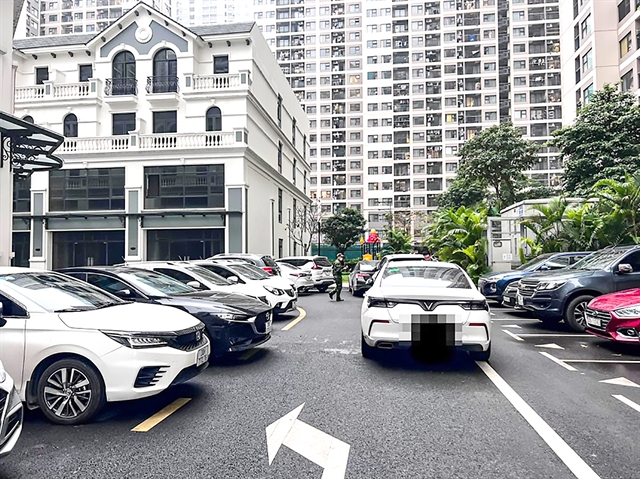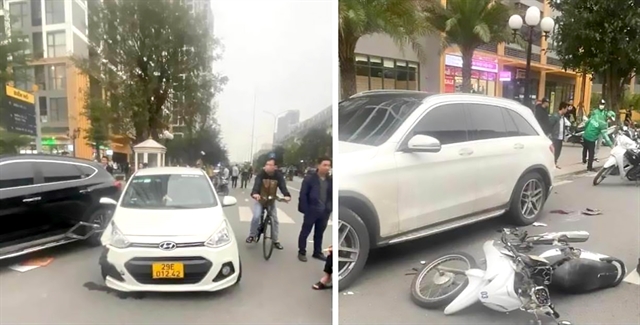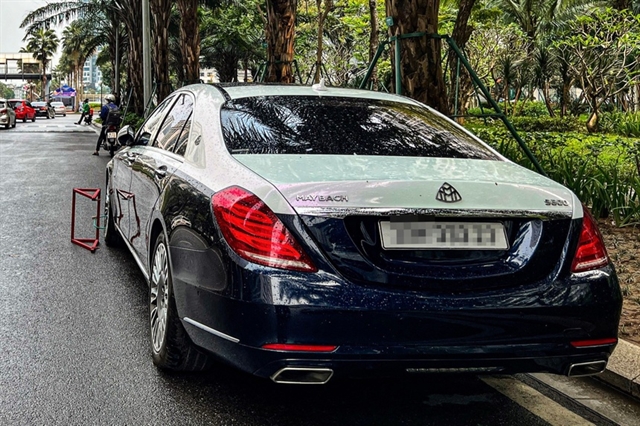 Society
Society


|
| A car parks in the middle of the road, blocking the exit in Hà Nội.— Photo zingnews.vn |
HÀ NỘI — The lack of parking spaces at apartment buildings across the capital is leading to conflicts between vehicle owners and security guards, with sometimes deadly consequences.
On March 28, Nguyễn Trung Dũng, 28, a security guard at a residential complex in Gia Lâm District, was killed after a taxi driver purposefully crashed into Dũng from behind.
Dũng was seriously injured and taken to Việt Nam - Germany Hospital, but did not survive.
The taxi driver had parked in the wrong place, so Dũng clamped his taxi’s wheels, leading to the conflict.
Although the consequences are more extreme, these conflicts are playing out across the capital.
Hải Sơn, 28, living in Nam Từ Liêm District, said his apartment complex has 34 floors and only one basement.
The other garage built by the apartment building's investor, about 800m away from the complex, is always full.
Sơn often has to park his car on the side of an internal road of the apartment building.
"Tomorrow, the security guard will clamp my car’s wheels," Sơn said. "I know that, but I have no choice.”
Hồng Minh, a resident living in an urban area with many residential buildings in Nam Từ Liêm District, said she has a space at a garage, but it is about 1km from her building.
She said it takes a lot of time to go to the garage on foot every day and vice versa.
It is also inconvenient if guests come to her house because there is no slot to park their car, she said.
"If you park in the wrong place, the security guard will clamp the car's wheel,” she said.
Then it takes time to handle it, she added.
Growing problem

|
| The aftermath of a conflict over parking. A taxi driver deliberately crashed into a security guard in an urban area in Gia Lâm District, Hà Nội after he clamped his car. — Photo vnews.gov.vn |
A resident and a member of the Management Board of an apartment building in Hà Nội said the apartment complex where she lives has four buildings. Each building has only one basement for parking.
At first, few people owned cars, so the basement space was adequate.
As the number of cars has increased and the basement is full, the investor has to build more garages to serve the residents demand.
However, some residents still park their cars on internal roads of the residential complex or even on the sidewalk, she said.
She said people visiting their relatives or friends also park their cars in the wrong place.
The buildings’ Management Board always creates conditions for residents or guests to park on internal roads for a very short time temporarily. Still, many people take advantage of the chance to park for a very long time, she said.
"Parking in the wrong place affects other residents," she said.
In the past, security guards only reminded people about parking at the right place, she said.
Now, they clamp cars’ wheels but do not require the owner of the car to pay a fine, she said.
“The security guard just wants to change the mindset of residents, who often park in the wrong place,” she added.
However, many residents thought that the security guards did not have the right to lock the car’s wheels off the residents, she added.
The owner often uses tools to cut the lock, causing conflict with the security guards, she said.
Clamping: right or wrong?

|
| A car clamped in an urban area of Hà Nội. Photo zingnews.vn |
Đặng Văn Cường, head of Chính Pháp Law Office under the Hà Nội Bar Association, talked to Zing online newspaper that there are two main reasons leading to the conflicts related to parking issues between residents and security guards in residential buildings over the past time.
The understanding of some residents about apartment-building management is incomplete, while the behaviour of some security guards is also substandard, he said.
He also said to clearly determine whether a security guard has the right to clamp cars parked in the wrong place, it is necessary to determine whether that road’s section is under the management of the apartment complex or the State.
If the road’s section belongs to the common ownership part of the apartment building, Clause 2, Article 100 of the Law on Housing 2014 stipulates that the management board of the apartment complex has the right to act on behalf of the owners to perform the management according to the regulations on management of the apartment building approved by the Ministry of Construction in Circular No 02/2016.
“They have the right to set internal requirements, prohibited stopping and parking locations and sanction for violators," he said. "The security guard is allowed to clamp a vehicle's wheel if the vehicle is found parking in the wrong place.”
If the road’s section belongs to the technical infrastructure system used for public purposes or is under the list of roads that have to be handed over to the State, it is not considered to belong to the common ownership part of the apartment building, he said.
In this case, the security guards are not allowed to apply regulations on parking locations set by the apartment building's Management Board, and stopping, and parking must comply with the provisions of the Road Traffic Law.
He said that handling violations must comply with the Government's Decree No 100 detailing penalties for administrative road traffic offences and rail transport offences.
He said that only State management agencies are allowed to deal with the violations.
"In this case, if a security guard clamps a car’s wheel, it is against the law and infringes the ownership rights of the vehicle owner," he said.
A representative of the Traffic Police Department under the Ministry of Public Security said it needs a written decision from the Minister of Transport to consider a road section in an apartment complex to be a traffic route if the road connects with national highways and expressways.
A written decision is needed from the chairman of the provincial People's Committee to consider a road in an apartment complex to be a traffic route, if it connects with local roads.
He said that if there is no written decision, it is considered a public area or an internal area of an individual or organisation. — VNS




